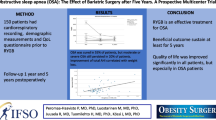Abstract
Background
Important endpoints of bariatric surgery are weight loss and improvement of comorbidities, of which obstructive sleep apnea (OSA) is the highest accompanying comorbidity (70 %). This study aimed to evaluate the influence of OSA on weight loss after bariatric surgery and to provide predictive factors for insufficient weight loss (defined as ≤50 % excess weight loss (EWL)) at 1 year follow-up.
Methods
All consecutive patients, who underwent primary laparoscopic Roux-en-Y gastric bypass or laparoscopic sleeve gastrectomy between 2006 and 2014 were retrospectively reviewed. Patients with data on preoperative apnea-hypopnea index (AHI) and pre- and postoperative body mass index (BMI) were included. After surgery, the percentage excess weight loss (%EWL) and BMI changes were compared between preoperatively diagnosed OSA-, subdivided in mild, moderate, and severe OSA, and non-OSA patients. Multivariable logistic regression analysis evaluated predictive factors for ≤50 % EWL.
Results
A total of 816 patients, 522 (64 %) with and 294 (36 %) without OSA, were included. After 1 year, OSA patients achieved less %EWL than non-OSA patients (65.5 SD 20.7 versus 70.3 SD 21.0; p < 0.01). The lowest %EWL was seen in severe OSA patients (61.7 SD 20.2). However, when adjusted for waist circumference, BMI, and age, no effect of OSA was seen on %EWL or changes in BMI. Although AHI, gender, age, BMI, type of surgery, and type II diabetes were predictive factors for ≤50 % EWL (area under the curve 0.778), the AHI as variable was of little importance.
Conclusions
The presence of OSA does not individually impair weight loss after bariatric surgery.

Similar content being viewed by others
Abbreviations
- AHI:
-
Apnea-hypopnea index
- BMI:
-
Body mass index
- CPAP:
-
Continuous positive airway pressure
- (%) EWL:
-
Percentage excess weight loss
- LRYGB:
-
Laparoscopic roux-en-Y gastric bypass
- LSG:
-
Laparoscopic sleeve gastrectomy
- OSA:
-
Obstructive sleep apnea
- PG:
-
Polygraphy
- PSG:
-
Polysomnography
References
Ogden CL, Carroll MD, Kit BK, et al. Prevalence of obesity among adults: United States, 2011–2012. NCHS Data Brief. 2013;131:1–8.
World Health Organization—Obesity and overweight. January 2015. Available at: http://www.who.int/mediacentre/factsheets/fs311/en/
Buchwald H, Oien DM. Metabolic/bariatric surgery worldwide 2011. Obes Surg. 2013;23(4):427–36.
Diamantis T, Apostolou KG, Alexandrou A, et al. Review of long-term weight loss results after laparoscopic sleeve gastrectomy. Surg Obes Relat Dis. 2014;10(1):177–83.
Puzziferri N, Roshek III TB, Mayo HG, et al. Long-term follow-up after bariatric surgery: a systematic review. JAMA. 2014;312(9):934–42.
Livhits M, Mercado C, Yermilov I, et al. Preoperative predictors of weight loss following bariatric surgery: systematic review. Obes Surg. 2012;22(1):70–89.
Maggard MA, Shugarman LR, Suttorp M, et al. Meta-analysis: surgical treatment of obesity. Ann Intern Med. 2005;142(7):547–59.
Karmali S, Brar B, Shi X, et al. Weight recidivism post-bariatric surgery: a systematic review. Obes Surg. 2013;23(11):1922–33.
Perugini RA, Mason R, Czerniach DR, et al. Predictors of complication and suboptimal weight loss after laparoscopic Roux-en-Y gastric bypass: a series of 188 patients. Arch Surg. 2003;138(5):541–5.
Saboor Aftab SA, Halder L, Piya MK, et al. Predictors of weight loss at 1 year after laparoscopic adjustable gastric banding and the role of presurgical quality of life. Obes Surg. 2014;24(6):885–90.
Coupaye M, Sabate JM, Castel B, et al. Predictive factors of weight loss 1 year after laparoscopic gastric bypass in obese patients. Obes Surg. 2010;20(12):1671–7.
Ortega E, Morinigo R, Flores L, et al. Predictive factors of excess body weight loss 1 year after laparoscopic bariatric surgery. Surg Endosc. 2012;26(6):1744–50.
Ritz P, Caiazzo R, Becouarn G, et al. Early prediction of failure to lose weight after obesity surgery. Surg Obes Relat Dis. 2013;9(1):118–21.
Ravesloot MJ, Van Maanen JP, Hilgevoord AA, et al. Obstructive sleep apnea is underrecognized and underdiagnosed in patients undergoing bariatric surgery. Eur Arch Otorhinolaryngol. 2012;269(7):1865–71.
Khan A, King WC, Patterson EJ, et al. Assessment of obstructive sleep apnea in adults undergoing bariatric surgery in the longitudinal assessment of bariatric surgery-2 (LABS-2) study. J Clin Sleep Med. 2013;9(1):21–9.
Buchwald H, Avidor Y, Braunwald E, et al. Bariatric surgery: a systematic review and meta-analysis. JAMA. 2004;292(14):1724–37.
Phillips BG, Hisel TM, Kato M, et al. Recent weight gain in patients with newly diagnosed obstructive sleep apnea. J Hypertens. 1999;17(9):1297–300.
Phillips BG, Kato M, Narkiewicz K, et al. Increases in leptin levels, sympathetic drive, and weight gain in obstructive sleep apnea. Am J Physiol Heart Circ Physiol. 2000;279(1):H234–7.
International Federation for the Surgery of Obesity and Metabolic Disorders. IFSO: are you a candidate. January 2015. Available at: http://www.ifso.com
Kribbs NB, Pack AI, Kline LR, et al. Objective measurement of patterns of nasal CPAP use by patients with obstructive sleep apnea. Am Rev Respir Dis. 1993;147(4):887–95.
Collins GS, Reitsma JB, Altman DG, et al. Transparent reporting of a multivariable prediction model for Individual Prognosis or Diagnosis (TRIPOD): the TRIPOD statement. J Clin Epidemiol. 2015;68(2):134–43.
Conflicts of Interest
The authors declare that they have no competing interests.
Compliance with Ethical Standards
All procedures performed in studies involving human participants were in accordance with the ethical standards of the institutional research committee and with the 1964 Helsinki declaration and its later amendments or comparable ethical standards. As this was a retrospective study, formal national consent is not required.
Informed Consent
Does not apply.
Funding
There was no funding source for this study.
Author information
Authors and Affiliations
Corresponding author
Rights and permissions
About this article
Cite this article
de Raaff, C.A.L., Coblijn, U.K., de Vries, N. et al. Predictive Factors for Insufficient Weight Loss After Bariatric Surgery: Does Obstructive Sleep Apnea Influence Weight Loss?. OBES SURG 26, 1048–1056 (2016). https://doi.org/10.1007/s11695-015-1830-4
Published:
Issue Date:
DOI: https://doi.org/10.1007/s11695-015-1830-4




